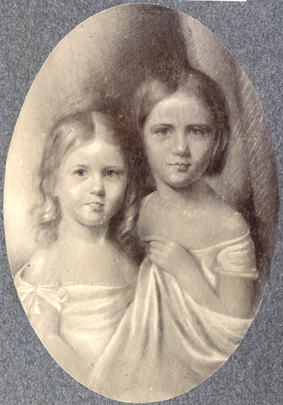 |
EMERSON IN HIS FAMILY: ELLEN AND EDITH 71. Photograph of portrait of Emerson’s daughters Edith (left) and Ellen (right) as young children, from Emerson family photograph album. Album from the estate of Amelia Forbes Emerson, 1982. Emerson took pleasure in his four children—Waldo, Ellen Tucker (generously named by Lidian for his first wife), Edith, and Edward Waldo. His interest in their development and activities made its way into his journals and letters. The death of Waldo in 1842 was one of the severest personal trials of his life. Ellen Tucker Emerson (1839-1909) was a life-long Concord resident and an active member of the community. Never married, she looked after her aging parents, traveled to Britain, Europe, and Egypt with her father after the fire at Bush in 1872, helped him keep his place in his papers on the lecture platform in his final years, and assisted James Elliot Cabot in editing his manuscripts. She also wrote a manuscript biography of her mother (published in 1980). A member of Concord’s School Committee, Ellen taught Sunday school at the First Parish and arranged social dances in the Town Hall. She lived in her parents’ home until her death. Unlike her older sister, Edith (1841-1929) married, moved away from Concord, and enjoyed a family life separate from her identity as an Emerson. In 1865, she married William Hathaway Forbes, a son of wealthy railroad magnate John Murray Forbes. They made their home in Milton, Massachusetts, and had eight children (six sons and two daughters). Her departure from the Emerson household prompted her father to comment, “There are several very agreeable circumstances about that child’s going away, but there is one sad one, and that is that she is gone … Yes she was an idle minx, but she has gone and she troubles me.” In 1871, at the invitation of Edith’s father-in-law, Emerson—worn out by lecturing—traveled by train to California. Edith and her husband were part of the excursion party. On this trip, Emerson met naturalist John Muir, an admirer of his writings and those of Thoreau. “Yesterday morning, 24 Feb. at 8 o’clock a daughter was born to me, a soft, quiet, swarthy little creature, apparently perfect & healthy. My second child. Blessings on thy head, little winter bud! & comest thou to try thy luck in this world & know if the things of God are things for thee? Well assured & very soft & still, the little maiden expresses great contentment with all she finds, & her delicate but fixed determination to stay where she is, & grow. So be it, my fair child! Lidian, who magnanimously makes my gods her gods, calls the babe Ellen. I can hardly ask more for thee, my babe, than that name implies. Be that vision & remain with us, & after us.”—RWE, journal, February 25, 1839 “Nellie waked & fretted at night & put all sleep of her seniors to rout. Seniors grew very cross, but Nell conquered soon by the pathos & eloquence of childhood & its words of fate. Thus after wishing it would be morning, she broke out into sublimity; ‘Mother, it must be morning.’ Presently, after, in her sleep, she rolled out of bed; I heard the little feet running around on the floor, and then, ‘O dear! Where’s my bed?’ “Be it known unto you that a little maiden child is born unto this house this day at 5 o clock this afternoon; it is a meek little girl which I have just seen, & in this short dark winter afternoon I cannot tell what color her eyes are, and the less, because she keeps them pretty closely shut: But there is nothing in her aspect to contradict the hope we feel that she has come for a blessing to our little company. Lidian is very well and finds herself suddenly recovered from a host of ails which she suffered from this morning. Waldo is quite deeply happy with this fair unexpected apparition & cannot peep & see it enough. Ellen has retired to bed unconscious of the fact & of all her rich gain in this companion. Shall I be discontented who had dreamed of a young poet that should come? I am quite too much affected with wonder & peace at what I have and behold & understand nothing of, to quarrel with it that it is not different.”—RWE to William and Susan Haven Emerson, November 22, 1841.
No image in this online display may be reproduced in any form, including electronic, without permission from the Curator of Special Collections of the Concord Free Public Library.
Next Entry - Previous Entry - Back to Section VI Contents Listing - Back to Exhibition Introduction - Back to Exhibition Table of Contents |